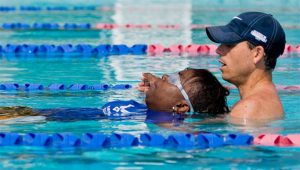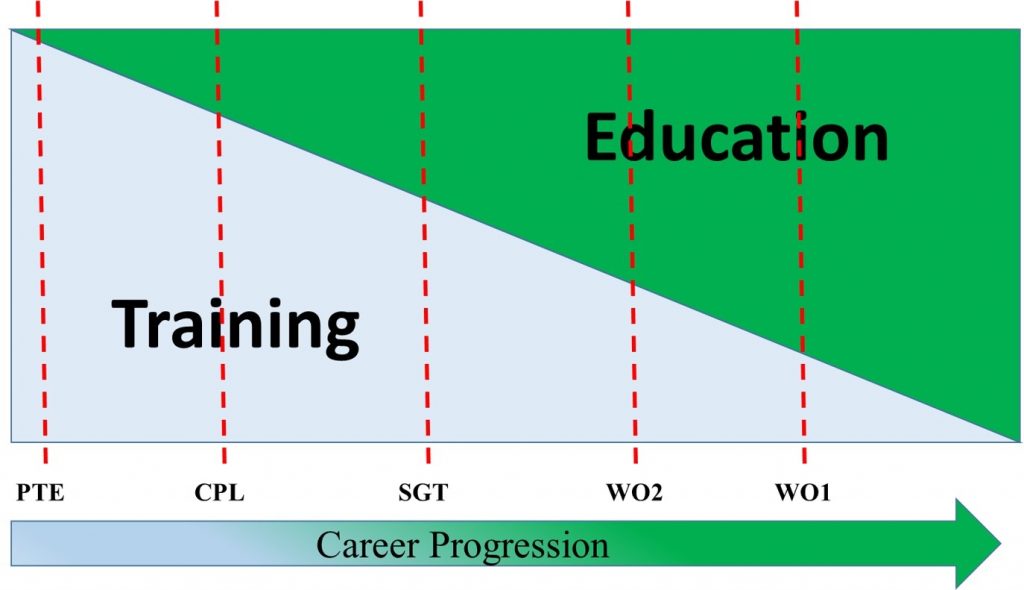Introduction
Professional mastery requires a disciplined approach to training that equips individuals and collective groups with learned skills, knowledge and positive attitudes. Australian Army doctrine reinforces this in LWP-G 7-0 and LWP-G 7-0-1, both of which relate to the conduct of training. However, this doctrine does not empower the collective group of non-commissioned officers (NCOs) and warrant officers (WOs) (for the purpose of the essay referred to as NCOs) to acquire the knowledge required to allow them to understand how to train. The aim of this essay is to pinpoint NCO training and education shortfalls in how NCOs are taught to train others. This gap in knowledge leaves the NCOs’ involvement in constructing a training program at a rudimentary level that focuses on short-term events and administrative support. A sports coach analogy will provide a comparative view that draws upon a common goal to develop individuals and build a team. This comparison does not limit the training mindset of an NCO to fitness specific training, rather it highlights a holistic methodology that considers all facets of soldier development.
NCOs and Sports Coaches

US Department of Defense
This essay specifically addresses the teaching role NCOs have within their organisations. Griffey (1991) assesses a teacher as someone who promotes a learning culture where they arrange and deliver learning opportunities that they can evaluate and, subsequently, resolve performance. Without doubt, this expectation also exists within a military context where an NCO acts as a teacher for their subordinates, very much like a sports coach is for their athletes and team. Teams are effective when coaches integrate individual skills into game play, especially when the teams have practised and are reactive, flexible and able to interpret changing injects. This is where the teacher becomes a coach who, with their knowledge, understanding of the rules, and desire to win, can construct an effective training progression and motivate others to perform.
A coach, like a military leader, has a mandate to teach individuals new skills and knowledge and build a team that becomes capable of achieving collective outcomes. At times, teambuilding is an unstated outcome of a civilian coaching relationship but within Army, teamwork is a core value. It is a deep belief that teams are part of the Army’s essence and range from individuals integrating into a unit, to Army contingents contributing to international communities. This vision establishes a remit that requires actors within those teams to be professional in their execution. Similarly, a national football team requires a head coach to execute a well-planned schedule and marshal players, assistant coaches and support staff, while building relationships with board members. Developing the expertise of professional coaches and NCOs comes from training, education and experience. However, navigating the networks used by a sports coach to win a grand final, or NCOs training soldiers to win in battle, is not simplistic and requires the hallmarks of an expert.
Professionalism does not propose that everyone is an expert; novices can be professional. Rather, it illustrates competence, proficiency and alignment to organisational values. According to Abraham and Collins (1998), experts have superior cognitive skill to organise conceptual knowledge and implement it in a specific, coherent and detailed manner. These are traits that expert sports coaches display to seek victory with national level athletes and teams. Likewise, NCOs should be experts within their fields to train and coach their teams to achieve outcomes for the nation.
A novice is the opposite to an expert. They form part of the coaching life-cycle that all coaches and NCOs move through. According to Bloom, Crumpton and Anderson (1999), an expert can identify relevant information within situations and assign a deeper meaning to the circumstance. A novice, however, takes his cues from the specified detail of the problem. This important distinction supports the notion that not all NCOs are expert teaches and coaches. Those that are not require education and nurturing in the science of training progression.
Winning requires a formula of skilled coaches, talented players and an understood purpose. Teams of all natures will have peaks and troughs applying these ingredients, but a coach who can interpret the environment, reduce the problem set, and deliver training solutions using interconnected and well-reasoned knowledge, will have success. This is contrary to a novice coach who, with good intentions, will usually stumble around trying to adjust these ingredients. Noticeably, the NCO promotion course training continuum does not equip NCOs with the resources and means to structure and assess a complete training cycle. According to doctrine, the organisational expectation of an NCO is to deliver training and observe the standard achieved.
Furthermore, curricula taught during career courses engineer a leadership mindset that motivates NCOs to rectify low performance through the application of behavioural remediation. Abraham and Collins (1998) contest that expert coaching is not a behavioural platform but a cognitive application that allows coaches to determine the appropriateness of the content and to make correct decisions within existing constraints. This view fits the model of an NCO when he is charged to lead his soldiers on operations but not when he is responsible to teach the same team during training. Therefore, an expert approach to achieve this involves a training continuum that prepares NCOs for the ill-structured coaching environment, develops a consistent ability to recognise patterns and reinforces the benefits of reflecting and rationalising.
Coaching Lifecycle
Military training and a sports coaching lifecycle follow a similar pattern. Commonly, within Army, a crawl, walk, run analogy expresses how a progression of training should advance. Likewise, Balyi (2001) encapsulates the sports coaching framework as Training to Train, Training to Compete and Training to Win. These two approaches appear to have similar logic; however, the Army doctrine stops short at providing NCOs with the knowledge of how to design the progression through crawl, walk, run.
Conversely, expert coaches are disciplined to a long term, methodical application when training an athlete and often seek specialised training to understand the specifics of each phase. Army can learn from this and investigate the utility of a learning framework to equip NCOs with advanced cognitive skills that develop the capacity to evolve as an expert coach. Incidentally, the Army Physical Training Instructor course provides its trainees this cognitive understanding to learn how to design and analyse training. This certainly makes sense within a physical training environment but why is it not recognised as relevant and transferable to other military training curricula?
Bloom’s Taxonomy
To be an expert, the teaching organisation must understand how people learn. In 1956, Benjamin Bloom led a committee of educators and together they assessed that humans learn within three domains. Firstly, the Psychomotor Domain is the skill-based and physical means to learn a behaviour or skill. Secondly, the Affective Domain engages the emotional and awareness senses to motivate learners to develop a learning behaviour. Finally, the Cognitive Domain is knowledge-based and progresses learning from remembering through analysing to evaluating information. NCOs can become experts when they interact amongst these domains, which enables them to assess when to introduce individuals and teams to greater complexity.
Currently, The All Corps Soldier Training Continuum (ACSTC) and trade courses throughout the career of an NCO are primarily psychomotor. Observations made by Colonel Hafner (2018), past Commandant LWC, identified that Figure 1 – 'Transition from Training to Education' provides an indicative transition that 'weights' training and education and requires shifts within Bloom’s Taxonomy as a soldier progresses. Unfortunately, the current approach to learning does not achieve this and remains significantly skills-based with limited development of the other learning domains. This is not an optimum developmental approach to achieve professional mastery. Certainly, NCOs will be professional but the organisation has not equipped them with the knowledge, ability and capacity to be experts themselves, nor teach others to be experts. That is why Army needs a framework that develops all learning domains, so NCOs can teach, coach and train their teams using a behavioural, procedural and cognitive perspective. This long-game approach is that of an expert sports coach and requires maturity, patience and reflection when growing high performance team members.

Figure 1: Transition from Training to Education
Key Limitation
Following a traditional military approach of assigning responsibilities, Army doctrine is the key limitation that denies a framework that would allow NCOs to develop as expert coaches. LWP-G 7-0-1 The Conduct of Training (2015) assigns training responsibilities to NCOs and officers through the training phases of analyse, design, develop, implement and evaluate. NCO tasks target preparation, delivery and evaluation of single lessons/activities to assigned objectives. This doctrine does not engage NCOs’ affective and cognitive domains and relegates NCOs’ influence to training within the psychomotor sphere. Consequently, training events are largely delivered without considering complex elements and do not challenge the decision cycle of individuals, nor react to training stimuli that trigger training adjustment.
This changes little as an NCO grows through his training life cycle. The ACSTC uses a pedagogy methodology and revisits skills-based training at each promotion course. The Subject One Sergeant Course exemplifies this by progressing learning for Senior NCOs to only design a micro cycle (one week) training schedule. The curriculum does not explore how to design a progressive schedule that achieves decisive single and/or multiple outcomes over time. Once in the workplace, there is a reliance on Senior NCOs to apply acquired career experience, good and bad, to fill the education gap, which may further create or reinforce error. This is where doctrine needs to reflect the need for NCOs to have the knowledge of a coach, so they progress upwards and can apply their experience and judgement with training design science. Importantly, the belief that seniority or a professional outlook makes someone an expert must not cloud judgement. Opportunity for novices to become experts relies on a learning framework that supports growth.
Conclusion
The Australian Army impresses that professional mastery is part of individual and team outcomes. However, this is not completely possible when doctrine does not require NCOs to design and analyse training. Currently their ability to train single elements of skill and knowledge delivers excellent results. However, with an under-developed cognitive understanding to synthesise a complete training cycle, NCOs will not become training experts. The extant pedagogy learning framework limits how NCOs develop, which relegates them to a one dimensional view of teaching, coaching and training. A sports coach lifecycle moves from novice to expert based on progressive performance observations that allows coaches to teach athletes and teams grand final winning skills and behaviours. A game-changing effect for Army would be a learning framework that is andragogy-based, which supports NCOs formulating knowledge and experience to identify patterns and allow reflection to rationalise improvements in training. This will empower the NCO Corps to become experts at training soldiers.









